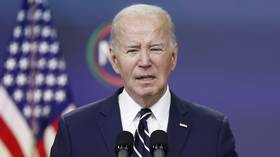‘Turkey shouldn’t become an EU member’: Merkel agrees with debate rival Schulz
The refugee crisis and the EU deal with Turkey dominated the TV debate between Chancellor Angela Merkel and her coalition ally SPD challenger Martin Schulz on Sunday. The rivals agreed, however, that Turkey can’t be part of the EU.
“If I become German chancellor, if the people of this country give me a mandate, then I will propose to the European Council that we end the membership talks with Turkey. Now all red lines are crossed, so this country can no longer become a member of the EU,”said Schulz during the debate, forcing the CDU leader to clarify her position on the issue.
“The fact is clear that Turkey should not become a member of the EU,”said Merkel, agreeing with Schulz.
“I’ll speak to my [EU] colleagues to see if we can reach a joint position on this so that we can end these accession talks,” added Merkel, who is hoping to get re-elected for a fourth term.
The government in Ankara is moving away from democratic principles at a “breathtaking” speed, Merkel said, adding that at the moment “the accession negotiations are non-existent.”
However, she refused to completely freeze the relationship with Turkey.
“If you want citizens to be freed, you have to continue the conversation,” she said, referring to the German citizens who have been imprisoned in Turkey over alleged spying activity.
Turkey has been receiving funding from the EU, which will reach €6 billion by 2018, as part of the deal to halt the migrant flow into Europe, signed in March 2016.
Turkey was also promised visa free travel and expedited talks on joining the EU, but the discussion of those issues remains stalled due to Ankara’s refusal to relax its harsh anti-terrorism laws.
'Wrong signal': Germany wants EU commission to suspend Turkey trade talks – report https://t.co/wpYVdKQFUIpic.twitter.com/cNqYkZDk7h
— RT (@RT_com) August 1, 2017
As EU-Turkish ties hang in the balance, President Recep Tayyip Erdogan has been actively reiterating his threats to withdraw from the deal and again allow migrants to pour into the EU.
During the debate, Schulz criticized Chancellor Merkel’s so-called “open door” policy approach in 2015, stating that Merkel had failed to involve the European partners in discussions at that time. The issue of migration has divided German society for nearly two years now, but it has become especially acute ahead of the federal elections which are scheduled for September 24.
'Turkey will never become a member of the EU' under Erdogan - Germn Foreign Minister https://t.co/fUu9wEFBuv
— RT (@RT_com) August 25, 2017
“What we need to fight the migration problem is a European solution, but not one at the expense of Germany, but in solidarity with all European countries,” said Schulz.
Merkel rejected the attacks, saying there are “moments when you have to decide,” and insisting that her decision to open borders was “absolutely correct.” The 63-year-old Chancellor noted that prior to making her choice, she spoke with the French leader and also discussed the migrant approach with former SPD Foreign Minister, Frank-Walter Steinmeier, as well as the SPD party chair Sigmar Gabriel, who currently serves as the country’s chief diplomat.
After accepting an estimated 1 million refugees in 2015, Germany has been facing a steady migrant inflow. The German Federal Office of Migration and Refugees (BAMF) in August announced that it had received 444,000 asylum applications in the first half of this year. That is an increase of 32 percent compared to the same period last year. Overall BAMF went on to grant asylum to 20.9 percent of the applicants, while 17.1 percent were granted temporary protection status.
#TVDuell Immediate reactions (after half of debate): Majority finds Angela #Merkel more credible and more likable than Martin #Schulz#BTW17pic.twitter.com/eBlqJWKLhH
— Kate Brady (@kbrady90) September 3, 2017
By the end of the 90-minute televised debate, Merkel came out victorious, a poll by ARD broadcaster said. Forty-nine percent of viewers viewed Merkel as a more credible candidate than Schulz. The SDP candidate secured 29 percent of those who favored his policies, DW reported.












